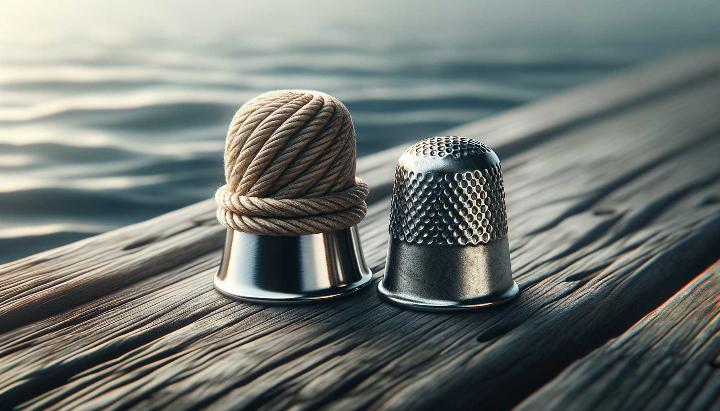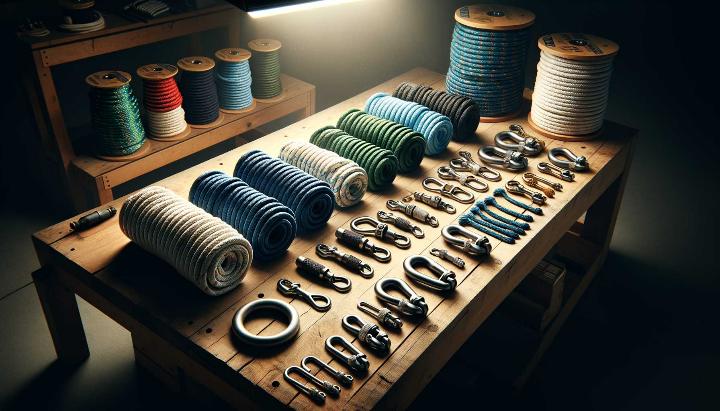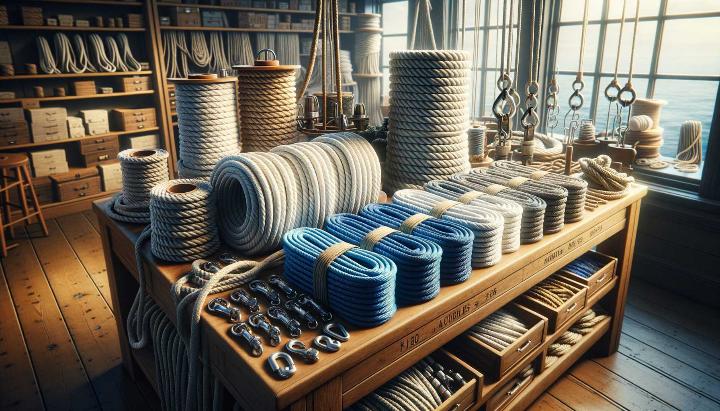Have you ever wondered why some ropes seem indestructible while others fray at the slightest touch? The secret lies in the unsung hero of the rigging world: the metal thimble. These small but mighty accessories are the backbone of any reliable rope system, protecting your lifeline from wear and tear in the most demanding environments.
In this deep dive into the world of rope materials and accessories, we'll unravel the mysteries behind metal thimbles, explore the diverse applications of different rope types, and discover how choosing the right material can make or break your project. Whether you're an off-road enthusiast, a yachting aficionado, or an industrial professional, understanding the nuances of rope systems is crucial for safety and efficiency.
Join us as we explore iRopes' comprehensive range of rope accessories, from precision-engineered metal thimbles to custom-designed lugs and sleeves. We'll reveal why industry leaders trust iRopes for their high-quality, tailored rope solutions, and how you can elevate your rigging game with the perfect combination of materials like nylon, polyester, and UHMWPE.
Prepare to be surprised by the innovation and engineering behind these seemingly simple tools. By the end of this journey, you'll never look at a piece of rope the same way again. So, are you ready to discover the hidden strength in your lifelines?
Understanding Metal Thimbles for Rope
Have you ever noticed those small, curved metal pieces at the end of heavy-duty ropes? Those are metal thimbles, and they play a crucial role in protecting and strengthening rope systems. As someone who's spent years working with various rigging setups, I can tell you that these unassuming accessories are absolute lifesavers - quite literally, in some cases!
Metal thimbles serve as a protective barrier between the rope and whatever it's attached to, preventing wear and tear that could compromise the rope's integrity. Imagine trying to tie your shoelaces with sandpaper - that's essentially what happens to ropes without thimbles when they're constantly rubbing against metal surfaces.
Types and Materials of Wire Rope Thimbles
When it comes to choosing the right thimble for your rope, there's more variety than you might expect. Let's break it down:
- Light-duty thimbles: Perfect for smaller diameter ropes and less demanding applications. They're often used in sailing and light industrial work.
- Heavy-duty thimbles: These are the workhorses of the thimble world, designed for larger ropes and heavy-load scenarios. You'll find them in construction, mining, and marine industries.
As for materials, the most common options are stainless steel and galvanized steel. Stainless steel thimbles offer superior corrosion resistance, making them ideal for marine environments. Galvanized steel, on the other hand, provides excellent strength at a lower cost, suitable for most land-based applications.

Installing and Using Metal Thimbles
Proper installation is key to getting the most out of your metal thimbles. Here's a quick guide:
- Choose the right size thimble for your rope diameter.
- Thread the rope through the thimble, creating an eye.
- Secure the rope using wire rope clips or by splicing, depending on the application.
- Ensure the rope sits snugly in the thimble's groove.
Remember, a well-installed thimble can significantly extend the life of your rope and improve overall safety. It's worth taking the time to do it right!
Have you ever had to replace a rope because it frayed at the connection point? With a properly installed metal thimble, that's a problem of the past. Trust me, your future self (and your wallet) will thank you for using thimbles in your rope setups.
Whether you're rigging up a sailboat, setting up a zipline, or working on a construction site, understanding and using metal thimbles is crucial for safe and efficient rope use. So next time you're handling rope, give a little nod to these unsung heroes of the rigging world!
Exploring Rope Applications Across Industries
From the docks of bustling harbours to the heights of towering skyscrapers, ropes play an integral role in our daily lives. As someone who's spent years working with various rope applications, I can attest to their versatility and importance. Let's dive into the fascinating world of rope uses and discover how this simple yet ingenious tool continues to shape our modern world.
Types of Rope for Different Uses
When it comes to rope, one size certainly doesn't fit all. The type of rope you need depends entirely on its intended use. Let me break it down for you:
- Natural fibre ropes: Made from materials like cotton, hemp, or sisal, these ropes are biodegradable and offer excellent grip. They're perfect for garden use or traditional sailing applications.
- Synthetic ropes: These include nylon, polyester, and polypropylene ropes. They're incredibly strong, resistant to rot, and ideal for most modern applications.
- Wire ropes: Composed of metal wires twisted together, these are the go-to choice for heavy-duty industrial applications.
Each type has its unique properties, and choosing the right one can make all the difference in your project's success.

Everyday Applications of Rope
You might be surprised by how often you encounter ropes in your daily life. Here are some common uses:
- Home and garden: From clotheslines to tree swings, ropes are essential for many household tasks.
- Sports and recreation: Think rock climbing, sailing, or even skipping rope for exercise.
- Pet care: Dog leashes and cat scratching posts often incorporate rope materials.
Have you ever tried your hand at macramé or other rope-based crafts? It's a fantastic way to appreciate the versatility of rope while creating something beautiful!
Specialized Rope Uses in Various Sectors
Beyond everyday applications, ropes play crucial roles in numerous industries:
- Marine industry: From mooring large ships to rigging sails on yachts, ropes are indispensable at sea.
- Construction: Wire ropes are used in cranes and elevators, literally lifting the industry to new heights.
- Rescue operations: Specialized ropes are vital for firefighters and mountain rescue teams, often making the difference between life and death.
As technology advances, so do rope applications. For instance, did you know that ropes made from ultra-high-molecular-weight polyethylene (UHMWPE) are now being used in space exploration? These ropes are so strong and light that they're perfect for tethering astronauts during spacewalks. Click here to discover the advantages and applications of UHMWPE ropes.
Whether you're a weekend DIY enthusiast or a professional in an industry that relies heavily on ropes, understanding the different types and their applications is crucial. So next time you're selecting a rope for a project, take a moment to appreciate the engineering and innovation behind this simple yet indispensable tool.
Choosing the Right Rope Material: A Comprehensive Guide
As someone who's spent years working with ropes in various industries, I can tell you that choosing the right material is crucial for the success of any project. Whether you're rigging a sailboat or setting up safety lines for a construction site, the rope material you select can make all the difference. Let's dive into the world of rope materials and explore how to make the best choice for your needs.
Types of Rope Materials: Synthetic vs Natural
When it comes to rope materials, we generally categorise them into two main groups: synthetic and natural. Each has its own set of characteristics that make it suitable for different applications.
- Synthetic ropes are made from man-made materials like nylon, polyester, and polypropylene. They're known for their strength, durability, and resistance to rot and mildew.
- Natural ropes are crafted from organic materials such as cotton, hemp, and sisal. While they may not be as strong as their synthetic counterparts, they often offer better grip and are biodegradable.
In my experience, synthetic ropes have become increasingly popular due to their superior strength-to-weight ratio and resistance to environmental factors. However, natural ropes still have their place, especially in traditional marine applications and eco-friendly projects.

Key Factors in Selecting Rope Material
When I'm advising clients on rope selection, I always emphasise the importance of considering several key factors:
- Strength: How much weight does the rope need to support? Nylon and polyester are top choices for high-strength applications.
- Flexibility: Will the rope need to bend easily? Nylon offers excellent flexibility, while polyester is a bit stiffer.
- UV resistance: For outdoor use, polyester shines with its superior UV resistance compared to nylon.
- Water absorption: If your rope will be exposed to water, polypropylene is a great choice as it floats and doesn't absorb water.
- Stretch: Need a rope with low stretch? Polyester is your go-to. For applications requiring some give, nylon's elasticity comes in handy.
Remember, there's no one-size-fits-all solution. The best rope material depends on your specific needs and the environment in which it will be used.
Best Rope Materials for Different Applications
Let's look at some common applications and the rope materials that work best for each:
- Marine use: Polyester is a top choice due to its UV resistance and low stretch. For traditional rigging, natural fibres like hemp are still popular.
- Climbing: Nylon is the go-to material for its excellent strength and ability to absorb shock.
- General purpose: Polypropylene is great for its affordability and resistance to rot, making it suitable for many everyday tasks.
Have you ever considered using UHMWPE (Ultra-High-Molecular-Weight Polyethylene) ropes? They're incredibly strong and lightweight, making them perfect for advanced applications like deep-sea mooring or even space tethers! Explore its uses in high-strength liners here.
Choosing the right rope material is a balance between performance, durability, and cost. By understanding the properties of different materials and considering your specific needs, you can make an informed decision that ensures your rope will perform reliably when you need it most. Remember, when in doubt, it's always best to consult with a rope specialist who can provide tailored advice for your unique situation.
iRopes' Comprehensive Range of Rope Accessories
As someone who's been in the rope industry for years, I can tell you that the right accessories can make or break your rigging setup. That's where iRopes comes in, offering a treasure trove of high-quality rope accessories that'll elevate your rope game to new heights. Let me walk you through their impressive range and show you why these little heroes deserve just as much attention as the ropes themselves.
Customized Solutions for High-Quality Rope Systems
One thing that sets iRopes apart is their commitment to customization. They understand that no two rope setups are exactly alike, and they're ready to tailor their accessories to your specific needs. I remember working on a challenging offshore project where standard thimbles just weren't cutting it. iRopes stepped in with a custom-designed thimble that not only solved our problem but also improved the overall safety of our rigging. Explore iRopes' selection of high-quality thimbles here.
- Precision-engineered metal thimbles: Available in various sizes and materials to suit different rope diameters and environmental conditions.
- Custom-designed lugs and sleeves: Perfect for creating secure terminations in specialised applications.
- Tailor-made hooks and fairleads: Engineered to meet specific load requirements and operational needs.
Have you ever found yourself wishing for a rope accessory that was just a little bit different from the standard offerings? That's where iRopes' customization service really shines. They're not just selling products; they're providing solutions.

Essential Hardware and Accessories for Professional Use
Now, let's talk about the bread and butter of iRopes' offerings - their essential hardware and accessories. These aren't your run-of-the-mill components; they're professional-grade tools designed for those who take their rope work seriously.
- High-performance carabiners: Crafted from aerospace-grade aluminum, these carabiners offer an unbeatable strength-to-weight ratio.
- Advanced ascenders and descenders: Engineered for smooth operation and enhanced safety in vertical rope work.
- Durable recovery rings: Perfect for off-road enthusiasts and rescue operations, these rings can handle extreme loads without breaking a sweat.
I've used plenty of rope accessories in my time, but iRopes' gear consistently impresses me with its quality and thoughtful design. It's the kind of equipment that gives you confidence when you're 100 feet up in the air or deep in a rescue operation.
What really sets iRopes apart is their understanding of how these accessories work together as part of a comprehensive rope system. They're not just selling individual components; they're providing the building blocks for safe, efficient, and professional-grade rigging setups.
Whether you're outfitting a commercial fishing vessel, setting up a high-angle rescue team, or rigging a complex construction project, iRopes has the accessories you need to get the job done right. And with their commitment to customization, you can be sure you're getting exactly what you need for your unique application.
So, next time you're planning a rope project, don't just focus on the rope itself. Take a good look at iRopes' comprehensive range of accessories. Trust me, your future self will thank you when you're out there, confident in your gear and ready to tackle any challenge that comes your way.
```htmlUnderstanding the role of metal thimble for rope is crucial in protecting and enhancing the longevity of rope setups across various industries. Whether it's the precision of synthetic or the traditional charm of natural fibre, choosing the appropriate material for making rope is pivotal for application success. iRopes excels in providing tailored solutions with top-notch accessories like lugs, sleeves, hooks, fairleads, and recovery rings, enhancing any rope used for tasks from construction to yachting. Embrace iRopes' extensive range to ensure your systems remain reliable and durable.
Discover iRopes Solutions for Enhanced Rope Applications
Fill in the inquiry form above to explore how iRopes can provide customized solutions tailored to your unique rope and accessory needs, ensuring your systems are equipped for success across various applications.
```